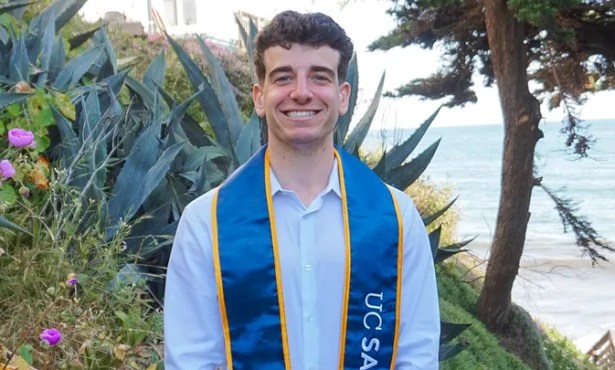Time of Your Life?

People love the expression, “It’s the time of your life.” It’s a common catchphrase for study abroad programs and travel agencies. It is an overplayed Green Day song. It even pops up as a headline for Facebook album titles.
But what does this phrase actually mean? Is it reserved for those with a foggy memory of thrilling past experiences? Or can it describe the present? How realistic is it for people to consider a current moment as superior to the rest of their life?
These questions came to me after I met Mari. She’s an international student from San Paulo, Brazil, studying at Santa Barbara City College for six months. She’s been to Isla Vista and she dated a fellow international student — a French guy — for a few months before he kissed her on both cheeks and returned home. I asked her if she missed him. Of course she did, but Mari didn’t seem too sad. In fact, it sounds like an ideal set up for an attractive 17-year-old traveling abroad for a few months.
Here, Mari is like a motorcyclist without a helmet, except she isn’t stupid. She is on one hell of a joy ride. She knows her temporary life in Santa Barbara is incredible: She’s become good friends with other students from all over the world within the small and accessible environment of her class that consists of about 15 students from four different countries. She is no longer confined by the constraints of parents or old friends. And she certainly isn’t as shy here like she often felt at home.
As she sat across from me at a picnic table on a perfect 70-degree day, it hit me that, right now, she believed she was having the time of her life. Well, maybe not at that exact moment as she answered several questions from a wannabe journalist. She could have been at the beach.
Her friend Victor sat next to her. He didn’t say much at first. He was from Fontainebleau, France. I perked up and told him I had been there and seen the castle. He smiled a bit and said, “Yeah there’s the castle and the forest, but there isn’t much else.” His English was impressive, I thought. He started learning English when he was 11.
Did he like Santa Barbara? And California? Of course he did. He’s been here for six months and has another two to go. He tries to speak mostly English but he falls into French at times when he’s with fellow French students. “Some words are hard to find,” he admitted. He kept up with me though, even when I probably spoke too fast.
Victor told me about his first experience in Isla Vista. He was stopped by the cops pretty quickly because he was walking down Del Playa with an open beer can. He is 17. He told the officer he was from France though and they poured out the beer and let him go. That almost never happens, I told him. He was shocked, too. His friend Pierre had sat down and joined us at this point. He chimed in, “In France, if you do something wrong, you go to jail.”
While I was talking to them, I forgot they were only 17. I couldn’t imagine living half a world away before I had even finished high school. When I was 17, I had thought freedom was going to a midnight showing of The Dark Knight.
Mari, Victor, and Pierre’s childhoods were much different than ones we consider typical in America. All three of them mentioned that they thought the 21-year-old drinking age played a big role in that difference. They had been used to drinking — more rosé and less Bud Light — at home and in public for years, and much later than the midnight Isla Vista curfew. Most students in I.V. don’t seem to act their age, they commented. After all, many I.V. residents are four and five years older than them.
Did Victor and Pierre think the chaos and absurdity of Isla Vista hampered their experience? No, they loved Santa Barbara and had obviously spent time rethinking old customs that had become second nature to them. They were able to reevaluate their own culture while experiencing a foreign one.
Was it the time of their life? Who knows? They might have to wait 50 years or so before they can say.
For Americans, college is an extended adolescence and an opportunity to meld recent independence with giddy youthfulness. Many people consider it the time of their life, especially if their parents fund it. Other cultures may commemorate a different point of life that’s considered prime. American young people might be a little behind foreigners on the maturity scale.
Before I left to study abroad last fall, several people told me traveling would be “the time of my life.” Some were older and thought highly of their youth. Others were recent returnees from abroad who apparently had blocked out the multiple dirty, eight-hour bus rides with nothing but a dead iPod and a half eaten bag of almonds.
But the point is relocating thousands of miles away — even for a short while — is often difficult and not always as fabulous as the rosy catchphrase suggests. Mari, Victor, and Pierre showed up in a foreign town and dove in, recognizing the positives and negatives that America has to offer, contemplating lifestyles on their way to and from Isla Vista and their downtown apartments.
Maybe it’s an overstatement to say that any one experience is the time of your life. The phrase is really just something to latch onto as we look back on enjoyable moments that we knew were fleeting. After all, the expression is fairly pessimistic for suggesting life is just downhill from there. But then again, if you believe that now is the time of your life, maybe it will be.



